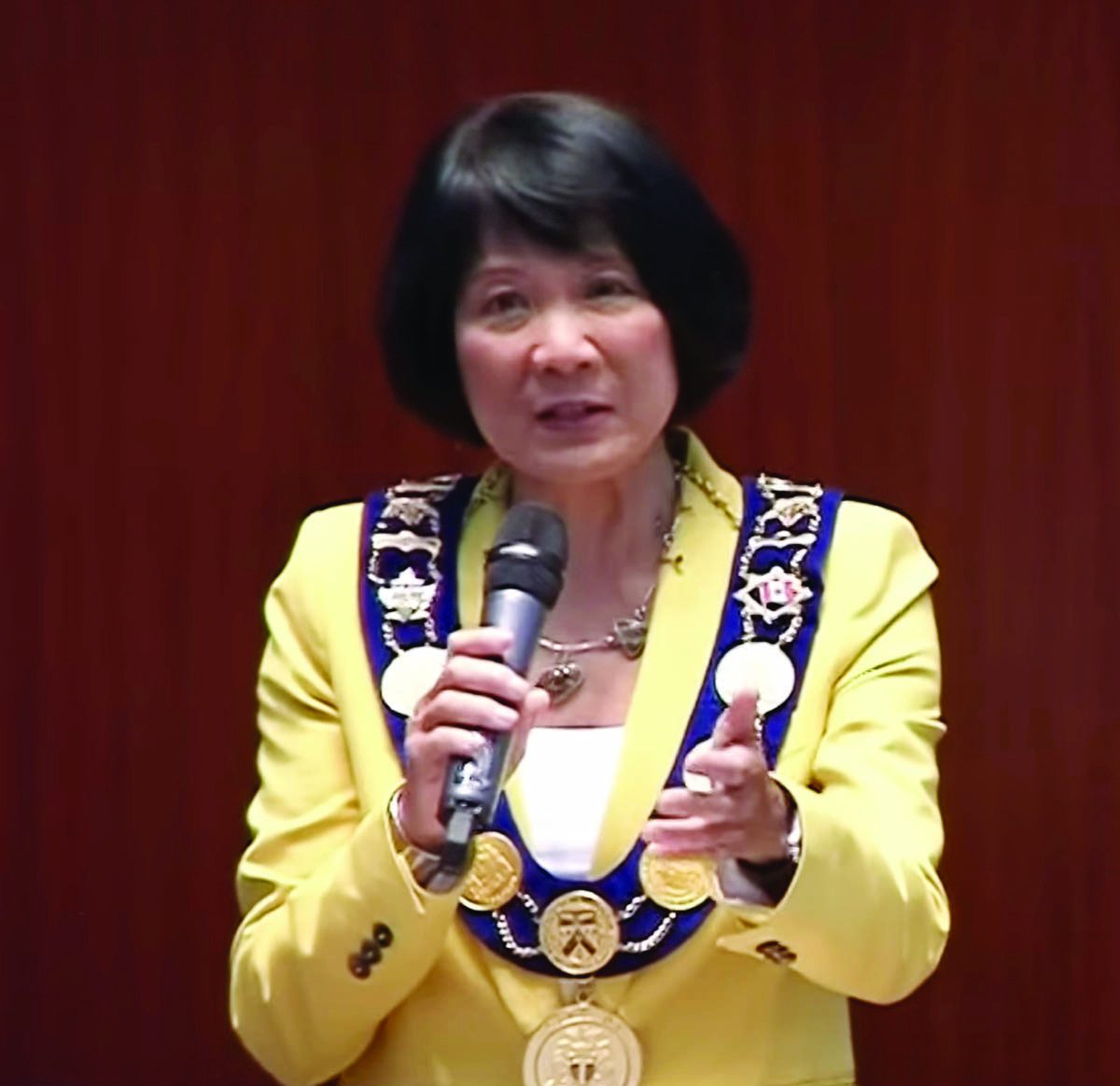Pinoy expectations high, big challenges for first racialized mayor of Canada’s biggest city
Pinoy expectations high, big challenges for first racialized mayor of Canada’s biggest city

Mayor Olivia Chow officially assumed her role as the 66th Mayor of Toronto and fifth Mayor since Amalgamation.
Photo: City of Toronto Media Relations news release
On Chow as Toronto’s new mayor:
By Veronica C. Silva
LJI Reporter
(with additional research from Lui Queaño)
The Philippine Reporter
July 13, 2023
Veteran politician Olivia Chow made history on July 12 for officially taking office as Toronto’s 66th mayor, the first racialized woman whose story is the envy of any immigrant or refugee to Canada. She is also the first woman mayor after the city amalgamated in 1998, making her the fifth mayor after the amalgamation.
The Hong Kong-born former member of parliament and Toronto City councillor captured more than 269,000 votes last June 26 to best the other 101 candidates. Her win was almost foretold in several pre-by-election polls where she always placed ahead of the pack. The voter turnout of 38 per cent was better than 2022’s turnout of only 30 per cent.

Paul Saguil, Filipino political analyst
“The high rate of participation in the by-election is a strong indication of a desire for change and a shared concern about the future of our city,” said Paul Saguil, Filipino political analyst, in an email reply to The Philippine Reporter.
“I’m not surprised by the higher voter turnout during the mayoral by-election,” said Grant Gonzales, also a political analyst, in a separate email. “The race was much more competitive than the 2022 mayoral election, so more Torontonians were paying attention, engaged, and motivated to vote.”
Saguil and Gonzales are co-founders of the Filipino Canadian Political Association, a group that seeks to encourage more kababayans to engage in Canadian politics, even encouraging them to run for political posts.

Grant Gonzales, political
analyst
Chow’s win was also not surprising to community leader Ben Corpuz, president of Philippine Advancement Through Arts and Culture (PATAC). “The campaign of affordable, safer, and caring city resonated with Torontonians,” he said. “The promise of change and integrity and experience of Olivia Chow helped her win … People wanted change … (on) the issues of housing, safety, transit and high cost of living, plus Olivia (had) a good campaign from the grassroots.”
Chow took the Declaration of Office around 11:30 a.m. Prior to the main ceremony, she had Indigenous Welcoming Ceremony at City Hall’s rooftop.
And after all the ceremonies, Chow faces challenges, including high expectations from the Filipino diaspora, which has its biggest concentration in the city of three million.
“Given the significant financial or budgetary problems facing Toronto, she (Chow) and Council will have to make some difficult decisions ahead — which may not even be popular with her supporters,” said Saguil.

Ben Corpuz, president of PATAC
“Olivia Chow has a daunting task in front of her — which is a similar situation faced by many history-making women and/or racialized individuals taking over prominent public roles and inheriting many legacy or ongoing issues.”
“Mayor Chow is a former NDP MP, and so we can expect her to champion left-leaning solutions to Toronto’s policy challenges,” added Gonzales. “The city faces a significant budget shortfall, paired with broad concerns among Torontonians about service delivery, housing, and affordability.”
The election issues that Saguil and Gonzales mentioned also came out from earlier election polls.
In her campaign plans, Chow tried to address some of these issues.

Al Quinn Alquinto,
a Migrante youth leader
In her speech at the ceremony, Chow alluded to the “budget hole left behind by the pandemic and our reluctant partners in Ottawa and Queen’s Park.”
Grant said that the challenge for Chow is to work with her council colleagues and other levels of government to address these issues.
But Saguil noted that Chow will have to address the city issues within a slightly shortened term.
“She will need to take advantage of the immediate “honeymoon period” to gain some quick wins, maintain alliances on Council, and deliver tangible progress for Toronto on a number of critical topics such as public transit, housing, and community safety.”

Elizabeth Pobre, coordinator for Bayan Canada Toronto
Community Expectations:
And after winning the votes, Chow is expected by Torontonians to deliver.
“My expectation … is (for) the voices of immigrant communities (to be) heard and their demands on issues — such as affordable housing, regularization of status – echoed,” said Al Quinn Alquinto, a Migrante youth leader based in Scarborough.
With Chow’s roots coming from the working class, Elizabeth Pobre, coordinator for Bayan Canada Toronto, is hoping that Chow “will open doors for people from marginalized groups who may not have considered a career in municipal government.”

Ellen Queaño from
Scarborough
Ellen Queaño from Scarborough wants Chow “to deliver on her campaign promises to fix the city’s housing and transportation crises and expand participation by underrepresented groups in the municipal government’s political, social, and cultural activities. It’s not an easy undertaking, but she showed political will during the campaign, so it’s not impossible.”
Malaya Canada in Toronto sent a statement:
“Campaign promises are lofty goals that will be tough to realize. Olivia may require both federal and local funding. Affordable housing and public transportation are two challenges that cannot be addressed only through campaign rhetoric. Voters placed their trust in her assurances that such pledges would be maintained. To cover the costs of providing low-cost housing and solving public transportation, voters would almost certainly have to support a tax increase. Olivia Chow may not be particularly concerned with issues such as rising crime, unemployment, and student loan debt in Toronto, but she will need to address them because these are also concerns of the grassroots, under-represented communities that gave her victory in the last elections. There are more important political issues that require attention than Olivia Chow attending a Filipino community’s celebration. These include migrant rights and red tagging of community activists.”
Gonzales added that Chow’s win “will certainly inspire the Filipino diaspora and other immigrant communities to engage in civic politics and shows that it is possible to win as a racialized immigrant woman.”
Comments (0)